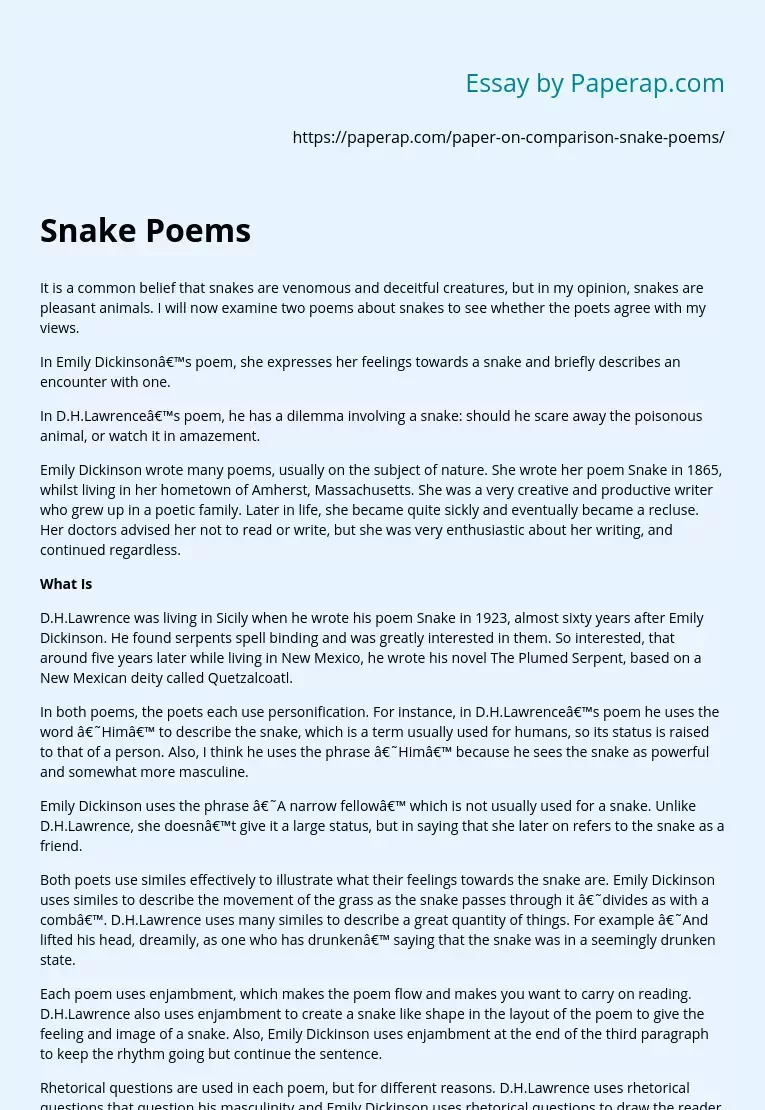In Defense of Snakes: Poetry Analysis
It is a common belief that snakes are venomous and deceitful creatures, but in my opinion, snakes are pleasant animals. I will now examine two poems about snakes to see whether the poets agree with my views.
In Emily Dickinson’s poem, she expresses her feelings towards a snake and briefly describes an encounter with one.
In D.H.Lawrence’s poem, he has a dilemma involving a snake: should he scare away the poisonous animal, or watch it in amazement.
Emily Dickinson wrote many poems, usually on the subject of nature. She wrote her poem Snake in 1865, whilst living in her hometown of Amherst, Massachusetts. She was a very creative and productive writer who grew up in a poetic family. Later in life, she became quite sickly and eventually became a recluse. Her doctors advised her not to read or write, but she was very enthusiastic about her writing, and continued regardless.
What Is
D.H.Lawrence was living in Sicily when he wrote his poem Snake in 1923, almost sixty years after Emily Dickinson.
He found serpents spell binding and was greatly interested in them. So interested, that around five years later while living in New Mexico, he wrote his novel The Plumed Serpent, based on a New Mexican deity called Quetzalcoatl.
In both poems, the poets each use personification. For instance, in D.H.Lawrence’s poem he uses the word ‘Him’ to describe the snake, which is a term usually used for humans, so its status is raised to that of a person.
Also, I think he uses the phrase ‘Him’ because he sees the snake as powerful and somewhat more masculine.
Emily Dickinson uses the phrase ‘A narrow fellow’ which is not usually used for a snake. Unlike D.H.Lawrence, she doesn’t give it a large status, but in saying that she later on refers to the snake as a friend.
Both poets use similes effectively to illustrate what their feelings towards the snake are. Emily Dickinson uses similes to describe the movement of the grass as the snake passes through it ‘divides as with a comb’. D.H.Lawrence uses many similes to describe a great quantity of things. For example ‘And lifted his head, dreamily, as one who has drunken’ saying that the snake was in a seemingly drunken state.
Each poem uses enjambment, which makes the poem flow and makes you want to carry on reading. D.H.Lawrence also uses enjambment to create a snake like shape in the layout of the poem to give the feeling and image of a snake. Also, Emily Dickinson uses enjambment at the end of the third paragraph to keep the rhythm going but continue the sentence.
Rhetorical questions are used in each poem, but for different reasons. D.H.Lawrence uses rhetorical questions that question his masculinity and Emily Dickinson uses rhetorical questions to draw the reader into the poem and make it more personal. Emily Dickinson
Uses ‘You may have met him, -did you not?’ and D.H.Lawrence uses several, like ‘Was it cowardice, that I dared not kill him?’ and ‘Was it humility, to feel so honoured?’
D.H.Lawrence’s poem has a rather serious atmosphere, however the tone varies throughout; masculine and harsh changes rapidly repeatedly to calm and peaceful, and back again.
Emily Dickinson’s poem is more up beat and light-hearted. It uses a friendly tone and makes you feel included.
These tones and atmospheres are created by the poets’ choices of language and imagery devices such as similes and onomatopoeia.
In reading both poems I have discovered that not all poems make sense, but have a certain depth and meaning to them. However, both poets show a lot of feeling and use many techniques to make their poems seem more interesting. Emily Dickinson doesn’t just explain that she’s afraid of the snake, but she also talks about nature and how she is one with it. D.H.Lawrence mentions his masculinity a lot, which makes me think that, he feels that the snake has some power over him because of the fact that the snake is venomous, and therefore does nothing until he gets the courage to do so.
The poem I found most effective was D.H.Lawrence’s poem because I found it to be more intriguing. Also, I found the poem to have a sense of doubt about it for example; when D.H.Lawrence starts to question his masculinity. I prefer this poem, because he was in touch with his feelings towards the snake then to how Emily Dickinson was, which made me want to understand the poem to more dept.
In Defense of Snakes: Poetry Analysis. (2019, Dec 05). Retrieved from https://paperap.com/paper-on-comparison-snake-poems/

